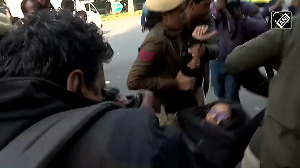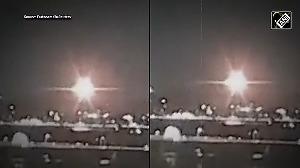Wen, who held talks with the visiting Defence Minister Pranab Mukherjee in Beijing, declared the Indian Minister's visit to China a "success" with the militaries of both sides reaching "extensive consensus" between them.
"Your visit to China is successful," Wen told Mukherjee, noting that he and Chinese Defence Minister General Cao Gangchuan had reached "extensive consensus" during their bilateral talks yesterday.
The two ministers had reached consensus to "endeavour" to hold joint military exercises and/or training programmes in the field of search and rescue, anti-piracy, counter-terrorism and other areas of mutual interest. Wen noted that military-to-military ties were an important component in state-to-state relations and the ongoing visit of the Indian Defence Minister during the India-China Friendship Year was a major event.
India, China to enhance military ties
Wen met Mukherjee at the leafy and picturesque Zhongnanhai leadership compound in central Beijing. Mukherjee, now on the third day of his six-day official visit, acknowledged that he had a "very useful" dialogue with his Chinese counterpart yesterday. He also pointed out to Wen that it was the first time for India and China to sign a Memorandum of Understanding (MoU) on defence cooperation.
"The MoU provides a framework to further expand our cooperation in the defence sector," Mukherjee said.
The Indian Defence Minister also had a meeting with the Vice Chairman of the Central Military Commission, General Guo Boxiong, before winding up the first leg of his official visit to China.
Mukherjee and Cao yesterday signed a historic and first-ever MoU to institutionalise military training and expressed their "endeavour" to hold joint military exercises and training programmes so as to add more content to their emerging strategic relations.
Earlier, Mukherjee had a meeting with Chinese Foreign Minster Li Zhaoxing, which he described as "very productive."
During their talks, Li pledged to step up strategic and cooperative relations with India in 2006, a year of friendship between the two neighbouring nations.
Mukherjee went to the Indian Embassy this morning and also toured the historic Forbidden City. Yesterday, he visited the ultra sensitive Beijing Aero Space Command and Control Centre of the PLA, the world's largest standing army of over 2.5 million.
He will also visit the headquarters of Lanzhou Military Region in Lanzhou city in northwestern China's Gansu Province and tour the Shanghai Naval Base in the country's economic hub in east China.
The official media in China, however, today effected a blackout of the first-ever MoU signed between India and China on joint military exercises, which is seen as an effort by Beijing not to further stoke international concerns amid the furore over the "China threat".
The Indian media covering Defence Minister Pranab Mukherjee's maiden visit to the Communist country were also prevented by the People's Liberation Army from entering the signing ceremony last evening, making it an in-camera event.
Mukherjee will leave for Singapore on June 2 to continue his three-nation official visit. The state-run Xinhua news agency, China Daily and People's Daily did not mention about the MoU signed by Mukherjee and his Chinese counterpart, General Cao yesterday.
Chinese Foreign Ministry Spokesman Liu Jianchao said the MoU was not targeted at any third party.
An official with the Indian delegation, responding to complaints from the Indian media said, "the PLA said they cannot permit the media to take photos as the MoU is secret."
However, the Indian side had made the MoU public.
The MoU is to institutionalise military training and to hold joint military exercises and training programmes so as to add more content to the two countries' emerging strategic relations. It provides a formal basis for the first time for defence and military exchanges that have been taking place between the two countries in the last few years.
Mukherjee will leave for Singapore on June 2 to continue his three-nation official visit.






 © 2025
© 2025